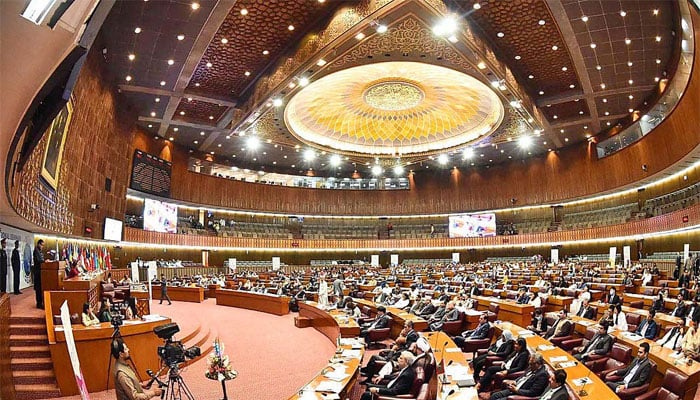Govt mulls introducing law to end defamation campaign against institutions
Draft of law is in circulation to amend the PPC and CrPC where up to five-year imprisonment will be awarded
February 05, 2023

- Ministry of Law and Justice fine-tuning draft before submission, sources say.
- Initiative aimed to end defamation campaign against institutions.
- Section is titled 'intentional ridiculing or scandalising of the state institutions, etc'.
ISLAMABAD: The federal government is considering taking strict measures to halt the defamation drive against the state institutions, including the judiciary, army and other constitutional organisations, The News reported on Sunday.
The enactment of such a law to penalise the elements carrying out such activities against institutions is also under consideration.
This legal development holds significant importance as an unending campaign of a political party — against the army, judiciary and other constitutional institutions — is in the swing.
Sources informed with legislation told The News that a draft of the legislation is in circulation to amend the Pakistan Penal Code (PPC) and Code of Criminal Procedure (CrPC) where up to five-year imprisonment will be awarded to whoever scandalises or ridicules the Pakistan Army and judiciary through any medium.
Before submission to the cabinet, the law is yet to get a final shape.
The bill has been authored by the Ministry of Interior and the Ministry of Law and Justice is busy with its fine-tuning before submitting it to the prime minister for putting it up before the cabinet. A cabinet summary has also been referred to with the draft.
The sources pointed out that the bill titled Criminal Laws (Amendment) Act, 2023, suggests a new section 500A after section 500 in PPC 1860. The new section is titled "intentional ridiculing or scandalising of the state institutions, etc".
The legislation provides that "whoever makes, publishes, circulates any statement or disseminates information, through any medium, with an intention to ridicule or scandalise the judiciary, the armed forces or any of their member will be guilty of an offence punishable with simple imprisonment for a term, which may extend to five years or with a fine which may extend to Rs1 million or with both."
Similarly, in the Schedule II of the PPC, a new section titled 500A has been added to Section 500, which says that the offender will be arrested without a warrant and the offence will be non-bailable and non-compoundable, which can only be challenged in a sessions court.
The cabinet summary says that recently the country has witnessed a spate of scandalous, derogatory and vicious attacks on certain institutions of the state, including the judiciary and armed forces.
It adds that "it is well-known that a deliberate cyber campaign has been launched for self-serving motives with the objective of inciting and nurturing hatred against important state institutions and their officials."
It also states that such attacks are focused on undermining the integrity, stability and independence of the country's state institutions.
The summary further mentions that judicial and army officials do not have the opportunity to step forward and negate scandalous, derogatory remarks while appearing in the media.
Given the long-tested legal principle noted in Section 196 of the CrPC, prior approval of the federal government before taking cognisance of the case or registration of a first information report (FIR) against any person has been made mandatory to avoid misuse of the mooted PPC section, the document suggests.
Constitutional experts are of the view that stringent laws are already part of the book to stop maligning the army, judiciary and other state institutions. In the presence of such laws, there is no need for fresh legislation.
Originally published in The News











